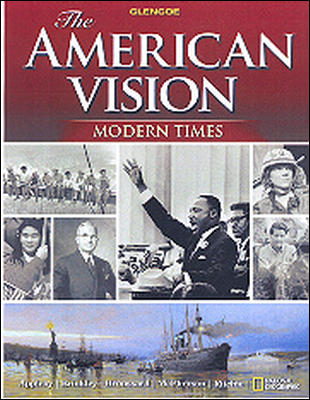The American Vision: Modern Times © 2008Chapter 18:
The Civil Rights MovementWeb Lesson PlansIntroduction
Students have read about how the civil rights movement galvanized when Rosa
Parks refused to surrender her bus seat to a white passenger. In this activity
students will identify how Parks's actions and personal qualities impacted the
civil rights movement.
Lesson Description
Students will use information from the Time 100: Rosa Parks Web site to learn
about Parks's decision to challenge Montgomery's segregation laws. Students
will read about how Parks made her decision, what qualities helped her to challenge
the law, and what happened after she refused to give up her seat. Students will
then answer four questions and apply this information by delivering an introductory
speech that describes the character and accomplishments of Parks.
Instructional Objectives- Students will identify Rosa Parks and explain how her decision to challenge
segregation laws impacted the civil rights movement.
- Students will be able to use this knowledge to deliver an introductory speech
that describes the character and accomplishments of Parks.
Student Web Activity Answers- African American passengers were not allowed to enter a bus through its
front door. After paying the fare, they had to exit the bus and reload through
the rear entrance. If the "white" section was full, they had to
move farther back when another white entered the bus. Also, African Americans
were not allowed to sit across the aisle from white passengers. If an African
American protested any of these practices, he or she was arrested for violating
the segregation laws.
- She was married and employed, and she demonstrated quiet strength, dignity,
and political savvy.
- Although the day of the bus boycott was rainy, Montgomery's African American population stayed off the busses by walking or catching cabs. African American cab drivers charged 10 cents per customer, which was standard bus fare, on the day of the boycott.
- Ms. Parks was arrested, released on bail, tried, convicted, and fined. Her
act sparked a citywide boycott of the bus system by African Americans that
lasted more than a year. The boycott raised Martin Luther King, Jr., to national
prominence and resulted in the U.S. Supreme Court decision outlawing segregation
on city buses. For her continued work in the struggle for civil rights, Parks
has received numerous honors, including the Presidential Medal of Freedom
and the Congressional Gold Medal.
- Students' introductions will vary.
 | 




